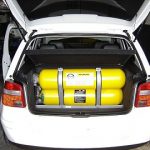In a decisive move to address the ongoing electricity challenges faced by Nigerian universities and other tertiary institutions, President Ahmed Bola Tinubu has approved the connection of these institutions to Compressed Natural Gas (CNG) as a sustainable and cost-effective energy solution. This decision was announced by the Minister of Education, Prof. Tahir Mamman, during a press conference in Abuja over the weekend.
The approval comes in response to growing concerns about the high cost of electricity in public institutions, particularly in the wake of subsidy removal and the re-categorization of electricity supply, which has significantly increased operational costs for universities and hospitals. Many institutions, including the University of Lagos (UniLag), have reported exorbitant electricity bills, with UniLag alone facing a monthly charge of over N470 million.
“The heads of the institutions are lamenting heavily about the high electricity bill they pay monthly,” stated Prof. Mamman. He further explained that the Ministry of Education, alarmed by these reports, sought immediate solutions and brought the issue to the attention of the Federal Executive Council (FEC). In response, President Tinubu approved the transition of universities to CNG as an alternative to the conventional power supply.
The initiative involves converting the campuses, vehicles, and other facilities of these institutions to run on CNG. This transition is expected to significantly reduce the financial burden of electricity on the schools, providing a more stable and affordable energy source.
CNG, known for being about 40% cheaper than petrol in Nigeria, offers a viable and sustainable energy alternative. With continued investments, CNG is anticipated to become an integral part of Nigeria’s energy mix, helping to alleviate the electricity challenges in the country’s educational sector.
This move by the government underscores its commitment to finding long-term solutions to the energy crisis affecting critical public institutions, ensuring they can operate more efficiently and affordably.










